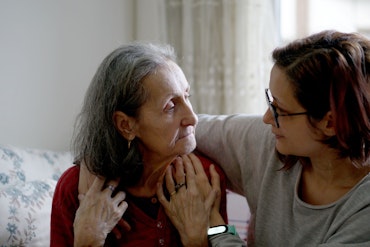Asking ‘Are you really ok?’ can make a difference for older Australians
With thousands of people around Australia in lockdown, quarantine or self-isolating to stay safe during the ongoing COVID-19 pandemic, the number of people feeling isolated or stressed is extremely high this R U Ok Day.
![<p>Even just a conversation about how an older person is going can help them to address their emotions, rather than keeping those feelings bottled up inside. [Source: Shutterstock]</p>](https://agedcareguide-assets.imgix.net/news/articles/news/articles/9_9_2021-R-U-OK-day-ACG-high.jpg?fm=pjpg&format=auto&w=550&q=65)
Even just a conversation about how an older person is going can help them to address their emotions, rather than keeping those feelings bottled up inside. [Source: Shutterstock]
Many people not confined to their homes are still living with tight social restrictions impacting their everyday lives physically, financially and socially and thousands of older Australians are also concerned about the pandemic’s threat to their health.
That’s why this year on R U OK day, Thursday 9 September, people are being encouraged to follow up their first question of ‘R U OK?’ with, ‘are you really ok?’.
Ten to 15 percent of all older Australians experience depression or anxiety, while the rates of people in residential aged care with depression are as high as 30 percent.
It is important for not only older Australians themselves, but also their carers and support networks to know that a person’s mental health could be at a low point without those around them knowing, and that even just a conversation about how they’re going can help them to address their emotions, rather than keeping those feelings bottled up inside.
If you live in a retirement village or receive aged care services at home checking up on the mental health of others could look like having a caring conversation with neighbours, friends or family – if you are in self isolation the conversation could even happen socially distanced over the fence.
For residents and staff of aged care facilities it can be important to have these conversations not just between residents but also between staff and residents, and even visitors.
Connecting with your family and friends outside your home can be done by phone, email, video call or social media if you can’t meet up in person.
Katherine Newton, Chief Executive Officer of R U OK? says while today is important for awareness, the organisation’s aim is for meaningful conversations around mental health to be commonplace.
“R U OK? is encouraging all Australians to pause and consider how the people in their world are really going, and to make asking ‘are you Ok?’ a part of their everyday,” she says.
“None of us are immune to life’s challenges, whether that’s a relationship breakdown, financial worries, work pressure or, sadly for some, the loss of a loved one.
“We want to emphasise that an R U OK? conversation is not only for when someone is visibly distressed or in crisis and remind everyone that their support can make a difference for anyone who is struggling.
“Sometimes it won’t be obvious that someone is having a hard time but we know that when we ask early and in a genuine way, we can help someone who might be struggling feel connected and supported, long before they are in crisis.”
R U OK? has resources you can use to talk about mental health with the people around you, but the following steps can be a good starting point for a conversation you can have today.
Ask ‘are you ok?’
Make sure you listen actively and without judgement to the answer
If the person says they are ok, ask them ‘are you really ok?’
If they answer that they are not ok, ask them if they want to talk about it and listen to what they say
Encourage them to take action by doing something they enjoy or find relaxing, or if they’ve been feeling like they’re not ok for more than two weeks, encourage them to contact a health professional
After your conversation check in with them – it could be a few days or a few weeks later depending on how much they were struggling – and show that you care about them by asking if they’ve been able to find a way to improve their situation
Stay connected with them and be supportive so that they know they have a person they trust to talk to when they are struggling.
If you need tips on how to stay connected with people in your life amid social restrictions we have put together some references for you about combating social isolation, mental health services for people in aged care and quality of life for older Australians, which could be used to improve your mental health and connect with people in your community.
For carers of older people a program called ‘Supporting Elders Through the Pandemic’ has just been endorsed by the Australian Community Workers Association to provide the aged care workforce with short activities that are emotionally meaningful for aged care residents and can be included in everyday care.
The program is provided by Wise Care, an education provider focusing on improving the mental health of aged care residents.
For urgent mental health support for yourself or someone you are worried about, call 13 11 14 to speak to Lifeline or visit the website to use a typed chat.























